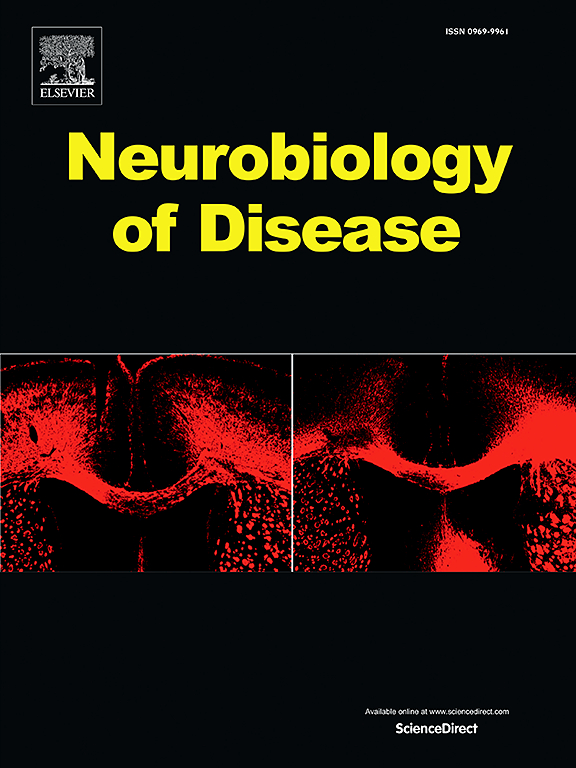二肽基肽酶 4 缺乏症可提高小鼠局灶性脑缺血后的存活率,并改善小胶质细胞活化和特定炎症标志物。
IF 5.1
2区 医学
Q1 NEUROSCIENCES
引用次数: 0
摘要
二肽基肽酶 4(DPP4;CD26)参与调节健康人的各种代谢、免疫和神经生物学过程。基于流行病学数据的观察结果表明,通常用于糖尿病患者的格列汀类药物对 DPP4 的抑制作用可降低脑缺血的风险,并可改善相关预后。然而,由于 DPP4 抑制剂的应用对 DPP4 酶活性的抑制既不完全,也不具有特异性,而且 DPP4 还具有非酶功能,因此其后果的多样性还存在争议。因此,我们利用 DPP4 基因敲除(KO)小鼠来分析 DPP4 对实验性局灶性脑缺血的细胞、免疫和功能性后果的具体贡献。我们观察到 DPP4 KO 小鼠缺血后的存活率明显提高,同时 DPP4 KO 小鼠脑组织中促炎性趋化因子 CCL2 的丰度降低,Iba1 阳性小胶质细胞的活化减少。此外,与野生型小鼠相比,缺血24小时至72小时后,DPP4 KO小鼠血浆中CCL5和CCL12的浓度以及脑组织中CCL17的浓度均有所下降。其他方面的分析,如功能性孟席斯评分、星形胶质细胞活化以及血浆和脑组织中的趋化因子水平都受到缺血的影响,但似乎不受 DPP4 KO 基因型的影响。综上所述,实验性消减小鼠的 DPP4 功能提高了小鼠的存活率,并改善了局灶性脑缺血后细胞和分子炎症的各个方面。本文章由计算机程序翻译,如有差异,请以英文原文为准。
Dipeptidyl peptidase 4 deficiency improves survival after focal cerebral ischemia in mice and ameliorates microglia activation and specific inflammatory markers
Dipeptidyl peptidase 4 (DPP4; CD26) is involved in the regulation of various metabolic, immunological, and neurobiological processes in healthy individuals. Observations based on epidemiological data indicate that DPP4 inhibition by gliptins, typically used in patients with diabetes, may reduce the risk for cerebral ischemia and may also improve related outcomes. However, as DPP4 inhibitor application is neither complete nor specific for suppression of DPP4 enzymatic activity and DPP4 has non-enzymatic functions as well, the variety of consequences is a matter of debate. Therefore, we here used DPP4 knock-out (KO) mice to analyze the specific contribution of DPP4 to cellular, immunological, and functional consequences of experimental focal cerebral ischemia.
We observed a significantly higher survival rate of DPP4 KO mice after ischemia, which was accompanied by a lower abundance of the pro-inflammatory chemokine CCL2 and reduced activation of Iba1-positive microglia cells in brain tissue of DPP4 KO mice. In addition, after ischemia for 24 h to 72 h, decreased concentrations of CCL5 and CCL12 in plasma and of CCL17 in brain tissue of DPP4 KO mice were observed when compared to wild type mice. Other aspects analyzed, such as the functional Menzies score, astrocyte activation and chemokine levels in plasma and brain tissue were affected by ischemia but appeared to be unaffected by the DPP4 KO genotype.
Taken together, experimental ablation of DPP4 functions in mice improves survival and ameliorates aspects of cellular and molecular inflammation after focal cerebral ischemia.
求助全文
通过发布文献求助,成功后即可免费获取论文全文。
去求助
来源期刊

Neurobiology of Disease
医学-神经科学
CiteScore
11.20
自引率
3.30%
发文量
270
审稿时长
76 days
期刊介绍:
Neurobiology of Disease is a major international journal at the interface between basic and clinical neuroscience. The journal provides a forum for the publication of top quality research papers on: molecular and cellular definitions of disease mechanisms, the neural systems and underpinning behavioral disorders, the genetics of inherited neurological and psychiatric diseases, nervous system aging, and findings relevant to the development of new therapies.
 求助内容:
求助内容: 应助结果提醒方式:
应助结果提醒方式:


